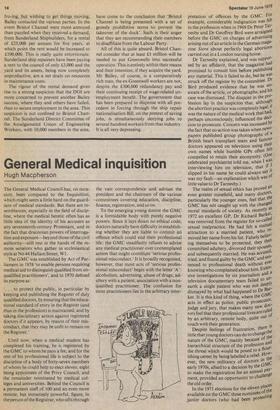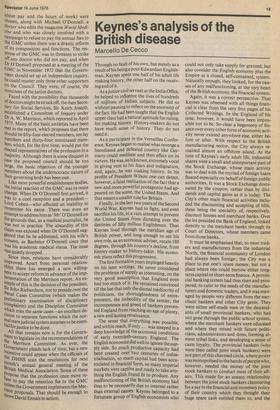General Medical inquisition
Hugh Macpherson
The General Medical Council has, on occasion, been compared to the Inquisition, which might seem a little hard on the guardians of medical standards. But there are resemblances, especially in the field of discipline, where the medical heretic often has as little idea of the identity of his accusers as any seventeenth-century Protestant, and in the fact that draconian powers of interrogation and exposure—beyond those of the civil authority—still rest in the hands of the remote senators who gather in ecclesiastical style at No 44 Hallam Street, WI. The GMC was established by Act of Parliament in 1858 'to enable persons requiring medical aid to distinguish qualified from unqualified practitioners', and in 1970 defined its purpose as : • . . . to protect the public, in particular by keeping and publishing the Register of duly qualified doctors, by ensuring that the educational standard of entry in the Register (and thus in the profession) is maintained, and by taking disciplinary action against registered doctors if it appears, by reason of their misconduct, that they may be unfit to remain on the Register.'
Until now, when a medical student has completed his training, he is registered by the GMC to whom he pays a fee, and for the rest of his professional life is subject to the discipline of a body of forty-seven members of whom he could help to elect eleven, eight being appointees of the Privy Council, and the remainder nominated by medical colleges and universities. Behind the Council is a permanent staff of 100 and an even more remote, but immensely powerful, figure, in the person of the Registrar, whosifts through the vast correspondence and advises the president and the chairmen of the various committees covering education, discipline, finance, registration, and so on.
To the emerging young doctor the GMC is a formidable body with purely negative powers. Since it lays down no ethical code, doctors naturally have difficulty in establishing whether they are liable to commit an offence which could end their professional life: the GMC steadfastly refuses to advise any medical practitioner over contemplated action that might constitute 'serious professional misconduct.' It is broadly recognised, however, that most acts of 'serious professional misconduct' begin with the letter 'A' : alcoholism, advertising, abuse of drugs, adultery with a patient, association with a nonqualified practitioner. The confusion for most practitioners lies in the arbitrary inter
example, considerable indignation was felt in the profession when in 1969 Dr Peter Tarnesby and Dr Geoffrey Bird were arraigned before the GMC on charges of advertising arising out of an article in the German magazine Stern about perfectly legal abortions carried out in a London nursing home.
Dr Tarnesby explained, and was supported by an affidavit, that the magazine had promised to consult him before publishing any material. This it failed to do, but he was struck off the register by the committee. Dr Bird produced evidence that he was unaware of the article, or photographs, and his case was dismissed. The disquiet in the profession lay in the suspicion that, although the abortion practice was completely legal, it was the nature of the medical work that had, 'perhaps unconsciously, influenced the decision to prosecute. Concern was increased bY the fact that no action was taken when newspapers published group photographs of a British heart transplant team and famous doctors appeared on television using their own names while humble GPs often felt compelled to retain their anonymity. (One celebrated psychiatrist told me, when I vola! interviewing him on television, that it. slipped in his name he could always say it was my fault—an explanation which was df little value to Dr Tarnesby.) The realm of sexual ethics has proved an even greater minefield, and many doctors, particularly the younger ones, feel that the GMC has not caught up with the changed moral standards of society. As recently as 1972 an excellent GP, Dr Richard Barker, was removed from the register for so-called sexual malpractice. He had felt a mutual attraction to a married patient, Whore moved her name from his list. Falsely believing themselves to be protected, they the° committed adultery, divorced their spouses, and subsequently married. He was accused, tried, and found guilty by the GMC and sentenced to professional death without ever knowing who complained about him. Extensive investigations by six journalists and 3 television documentary team failed to unearth a single patient who was not deePlY dismayed by what had happened to Dr Barker. It is this kind of thing, where the GMC acts in effect as police, public prosecutor, judge and jury, that makes many new cid.c; tors feel that their professional lives are al, by an arbitrary, remote body, quite Put ° touch with their generation. Despite feelings of frustration, there is little that young doctors can do to change the nature of the GMC, mainly because 0fth,e hierarchical structure of the profession Oa the threat which would be posed to a flourishing career by being labelled a rebel. ever, the new militancy of doctors in the early 1970s, allied to a decision by the Givitto make the registration fee an annual paY: ment, provided an opportunity to challenge the old order. In the 1971 elections for the eleven Plae_ese available on the GMC three nominees of th junior doctors (who had been protesting
about pay and the hours of work) were Chosen, along with Michael O'Donnell, a doctor who edits the magazine World Medi
cine and who was closely involved with a campaign to refuse to pay the annual fees to
the GMC unless there was a drastic reform of its composition and functions. The resPonse of the GMC was to threaten to strike
off any doctor who did not pay, and when
Dr O'Donnell proposed at a meeting of the GMC in November 1972 that the Govern ment should set up an independent inquiry, he could muster only three other supporters Ott the Council. They were, of course, the nominees of the junior doctors.
Faced with the possibility that thousands of doctors might bestruck off, the then Secretary for Social Services, Sir Keith Joseph, established a Committee of Inquiry under Dr A, W. Merrison, which reported in April 1975. Many of the basic anxieties have been Met in the report, which proposes that there Should be fifty-four elected members, ten lay Members and thirty-four nominated members which, for the first time, would put the elected representatives of the profession in a majority. Although there is some disquiet in case the proposed council should be too large, the basic objection of the younger Members about the undemocratic nature of their governing body has been met.
Like most powerful establishment bodies, the initial reaction of the GMC was to resist Change. When Dr O'Donnell first arrived, it Was to a cool reception and a president— Lord Cohen—who affected an inability to remember his name. There was even an attempt to address him as 'Mr' O'Donnell on the grounds that, as a medical journalist, he Was not in practice. The absurdity of this claim was exposed when Dr O'Donnell suggested that he be addressed, with his wife's consent, as Bachelor O'Donnell since that Was his academic medical status. The issue vas quietly dropped. , Since then, relations have considerably improved. Apart from personal relationships there has emerged a new willingness to accept reform in advance of the implementation of the Merrison report. An example of this is the decision of the president, ir John Richardson, not to preside over the Penal Cases Committee (which makes the Preliminary examination of disciplinary Complaints) and the Discipline Committee Which tries the same cases—an excellent decision to separate functions which the noral state judicial system assumes to be essential for justice to be done.
All that remains now is for the Government to legislate On the recommendations of
Merrison Committee. As ever, the overnment pleads lack of time, but a new Incentive could appear when the officials of the DHHS scan the resolutions for next trienth's annual general meeting of the ruish Medical Association. Some of these pr°Dose that the profession once more reuse to pay the retention fee to the GMC Urnless the Government implements the Merls°n proposals. That should be enough to lUuve David Ennals to action.



































 Previous page
Previous page